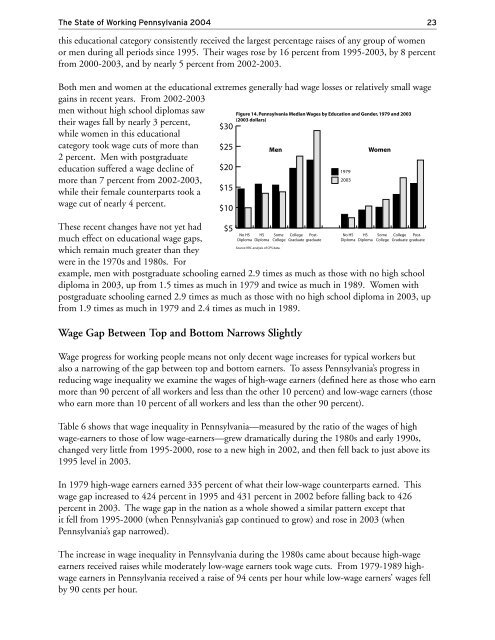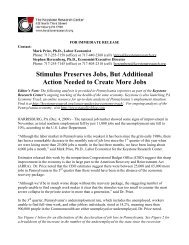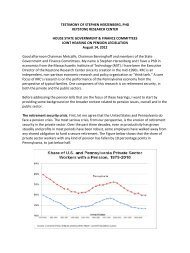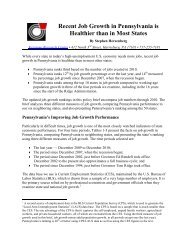The State of Working Pennsylvania 2004 - The Keystone Research ...
The State of Working Pennsylvania 2004 - The Keystone Research ...
The State of Working Pennsylvania 2004 - The Keystone Research ...
You also want an ePaper? Increase the reach of your titles
YUMPU automatically turns print PDFs into web optimized ePapers that Google loves.
<strong>The</strong> <strong>State</strong> <strong>of</strong> <strong>Working</strong> <strong>Pennsylvania</strong> <strong>2004</strong> 23<br />
this educational category consistently received the largest percentage raises <strong>of</strong> any group <strong>of</strong> women<br />
or men during all periods since 1995. <strong>The</strong>ir wages rose by 16 percent from 1995-2003, by 8 percent<br />
from 2000-2003, and by nearly 5 percent from 2002-2003.<br />
Both men and women at the educational extremes generally had wage losses or relatively small wage<br />
gains in recent years. From 2002-2003<br />
men without high school diplomas saw<br />
their wages fall by nearly 3 percent,<br />
while women in this educational<br />
category took wage cuts <strong>of</strong> more than<br />
2 percent. Men with postgraduate<br />
education suffered a wage decline <strong>of</strong><br />
more than 7 percent from 2002-2003,<br />
while their female counterparts took a<br />
wage cut <strong>of</strong> nearly 4 percent.<br />
<strong>The</strong>se recent changes have not yet had<br />
much effect on educational wage gaps,<br />
which remain much greater than they<br />
were in the 1970s and 1980s. For<br />
<br />
<br />
<br />
<br />
<br />
example, men with postgraduate schooling earned 2.9 times as much as those with no high school<br />
diploma in 2003, up from 1.5 times as much in 1979 and twice as much in 1989. Women with<br />
postgraduate schooling earned 2.9 times as much as those with no high school diploma in 2003, up<br />
from 1.9 times as much in 1979 and 2.4 times as much in 1989.<br />
Wage Gap Between Top and Bottom Narrows Slightly<br />
<br />
<br />
<br />
<br />
<br />
<br />
<br />
<br />
<br />
Wage progress for working people means not only decent wage increases for typical workers but<br />
also a narrowing <strong>of</strong> the gap between top and bottom earners. To assess <strong>Pennsylvania</strong>’s progress in<br />
reducing wage inequality we examine the wages <strong>of</strong> high-wage earners (defined here as those who earn<br />
more than 90 percent <strong>of</strong> all workers and less than the other 10 percent) and low-wage earners (those<br />
who earn more than 10 percent <strong>of</strong> all workers and less than the other 90 percent).<br />
Table 6 shows that wage inequality in <strong>Pennsylvania</strong>—measured by the ratio <strong>of</strong> the wages <strong>of</strong> high<br />
wage-earners to those <strong>of</strong> low wage-earners—grew dramatically during the 1980s and early 1990s,<br />
changed very little from 1995-2000, rose to a new high in 2002, and then fell back to just above its<br />
1995 level in 2003.<br />
In 1979 high-wage earners earned 335 percent <strong>of</strong> what their low-wage counterparts earned. This<br />
wage gap increased to 424 percent in 1995 and 431 percent in 2002 before falling back to 426<br />
percent in 2003. <strong>The</strong> wage gap in the nation as a whole showed a similar pattern except that<br />
it fell from 1995-2000 (when <strong>Pennsylvania</strong>’s gap continued to grow) and rose in 2003 (when<br />
<strong>Pennsylvania</strong>’s gap narrowed).<br />
<strong>The</strong> increase in wage inequality in <strong>Pennsylvania</strong> during the 1980s came about because high-wage<br />
earners received raises while moderately low-wage earners took wage cuts. From 1979-1989 highwage<br />
earners in <strong>Pennsylvania</strong> received a raise <strong>of</strong> 94 cents per hour while low-wage earners’ wages fell<br />
by 90 cents per hour.







